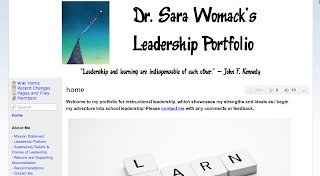Many products and ideas have bled from the business world into education. The first videoconference took place at the World's Fair in 1964 and began to flourish in corporations through the 1990s. Today, students and teachers regularly Skype with experts from around the world. Last year, our art teacher took a yearlong sabatical to work with a communications contractor in Iraq. After learning about her situation, our students developed questions and conducted multiple Skype sessions with her.
These sessions provided insight into the Iraqi conflict and culture for our students. Another example is
The 7 Habits of Highly Effective People by Stephen Covey, which was first written to help people solve personal and professional problems. Now, schools across the nation are utilzing his practices with students to improve character.
The Leader in Me outlines steps for children to become more creative, responsible, and tolerant. Schools can even become
Lighthouse Schools, which exemplify the common language and culture of leadership.
Portfolios have been utilized in schools as a valid tool for student assessment and have also served as a snapshot of skills and abilities for jobseekers. But in today's technologically-based world, where cutting edge expertise is valued, e-portfolios have been utilized as a way to evaluate student performance, as well as a way for jobseekers to promote themselves to prospective employers. E-portoflios have been widely popular in the business world, but in education, this method of self-promotion is just beginning to flourish.
Part of the culminating assessments for my educational leadership program was a portfolio containing artifacts from my classes, as well as my residency activities. The portfolio was a 2" binder that contained page after page of writing, charts, and presentation handouts. It's organized by standard, but if a principal was looking through my portfolio, it might be difficult to find evidence of how I can organize a master schedule or develop a school budget.
I thought that an e-portfolio might be a good way to showcase my skills and abilities in school leadership. In my e-portfolio, which I developed on wikispaces, I included my mission statement, leadership platform, supervisory beliefs, and resume, as well as work samples from my classes, residency, and teaching career. Now, I can send a principal a link to my e-portfolio instead of just emailing or faxing my resume. I'm hoping that my e-portfolio will inspire a principal to ask me for an interview! It has definitely prepared me for an interview by offering a chance to self-evaluate my skills.
Check out my
e-portfolio! What do you think?



